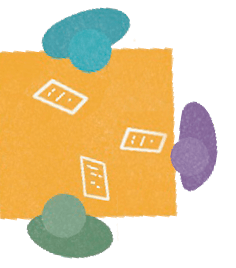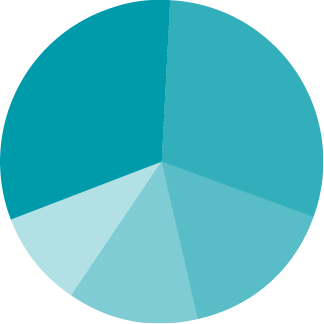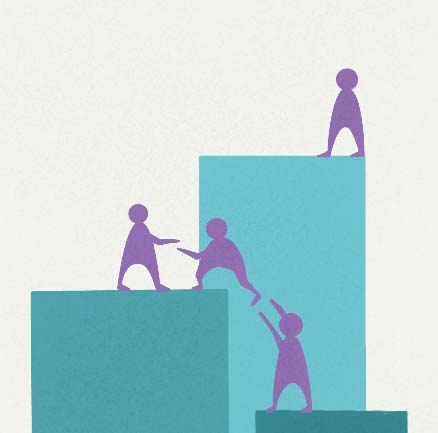ANNUAL REPORT 2021
Pursuing
Community
Centered
Accountability
Our Year in Review
This year’s story is one of remarkable progress to break down intentionally-created obstacles to justice and equity. Some of our organization’s proudest moments this year came when a community in Uganda bravely spoke to World Bank officials about their demand for accountability from an abusive project, and seeing their complaint move forward as a result; beholding communities in Nepal speaking their truth to European bank officials after a years long investigation led to validation of their grievances; seeing new communication tools we developed provide a direct input channel for those most impacted by abuses to communicate remotely and at scale; and seeing nine separate institutions improve their accountability policies as a direct result of our tenacious advocacy. These are just a few examples from our past year of collaborating with Indigenous and local people, and advocates around the world, to identify and surmount these obstacles.
The obstacles facing communities seeking justice, dignity, and respect for their environment concern all of us. How are they intentional? These obstacles are built by corporations who seek profits absent meaningful regulatory or moral guides, knowing that their operations cause harm; government officials who prefer violence and corruption to ethical governance; and global institutions that overtly operate with impunity when not held accountable by their shareholders. It requires all of us to challenge and dismantle these obstacles.
The context of this progress is a shifting landscape. Climate change intensifies the stakes, while security threats and COVID have made the work more challenging. Where we used to see occasional security threats and physical and digital risks to community partners, civil society colleagues, and our own team, we now see threats almost across the board. We have never shied away from working with communities facing oppressive conditions, that is of course why we exist — to partner with communities who most need support to be heard as they speak out to defend their rights. However, what’s being asked of these communities now is heartbreaking and unthinkable: Indigenous farmers in Nepal who risk imprisonment for defending their land, parents in Uganda who face illegal detention for protesting forced displacement, forest-dwelling communities in Myanmar fighting to survive dictatorship, while defending forests and fragile mangroves. As COVID continues with communities where we work the last to receive vaccines, investments are continuing to cause harm. We have had mixed results pushing back against some using the pandemic as an excuse to cut corners around community engagement, while delaying accountability processes.
Our team confronts these barriers every day by building strength. We do this through working in deep partnership with community and civil society partners, but also by developing the data, research, and analysis our field needs, and that our own policy team actively uses, to push for systemic change. In this past year, we’ve also explicitly named our efforts to do solidarity fundraising — the process of building capacity of partners where philanthropic resources are not equitably reaching organizations doing some of the hardest work — this includes making funder introductions and assisting with grant applications for groups like AREDE in Haiti and Witness Radio in Uganda. Our theory of change relies on their success in building strong, resourced organizations that can focus on community organizing and speaking truth to power.
In turn, our success relies on you. Thank you for being part of our collective movement for justice,
equity and dignity.

Natalie Bridgeman Fields
FOUNDER & EXECUTIVE DIRECTOR
This year’s story is one of remarkable progress to break down intentionally-created obstacles to justice and equity. Some of our organization’s proudest moments this year came when a community in Uganda bravely spoke to World Bank officials about their demand for accountability from an abusive project, and seeing their complaint move forward as a result; beholding communities in Nepal speaking their truth to European bank officials after a years-long investigation led to validation of their grievances; seeing new
communication tools we developed provide a direct input channel for those most impacted by abuses to communicate remotely and at scale; and seeing nine separate institutions improve their accountability policies as a direct result of our tenacious advocacy. These are just a few examples from our past year of collaborating with Indigenous and local people, and advocates around the world, to identify and surmount these obstacles.
Our Mission
Accountability Counsel amplifies the voices of communities around the world to protect their human rights and environment. We work to center communities in the decisions that impact their rights, livelihoods, land, ecosystems, and our climate. As advocates for people harmed by internationally financed projects, we employ community driven and policy level strategies to access justice.
Our Values
Our Approach
Accountability Counsel specializes in a little known but highly effective tool for communities to have their voices heard at the highest levels of power: the accountability offices tied to the financial institutions that funnel trillions of dollars every year—including US taxpayer dollars—into projects like dams, mines, oil pipelines, hydroelectric projects, and more. These projects are notorious for environmental and human rights abuses, such as forced displacement of Indigenous Peoples, poisoned rivers used for drinking water, and sexual abuse of women and girls.
We work alongside communities as they pursue justice through our Communities work, advocate for effective and transparent accountability offices through our Policy Advocacy program, and harness data while creating bespoke tools to inform our field and support communities through Research. These programs work in tandem to support communities in shifting global financial systems toward greater justice.
Our Team
Our global team of fifteen advocates based in Africa, Asia, and North America works to strengthen global accountability ecosystems in deep partnership with communities around the world.
We benefit from the leadership of our Board of Directors, guidance from our Advisors, and support of fellows and interns. Meet our team here.
Community-Centered Casework
Communities are the experts in what justice means for them, so at Accountability Counsel we work at the request of communities in support of their goals. Our expertise in accountability office strategies adds value to locally-led approaches in pursuit of human rights and environmental justice. Learn more about our community partners and their advocacy here.
In the midst of the COVID-19 pandemic, members of the Kawaala II community in Kampala, Uganda face eviction to make way for a World Bank-funded drainage channel. The project is set to displace more than 100 families from their homes and farmlands—some of which were damaged by excavators as part of a violent eviction process in December 2020.
With strengthened support from Accountability Counsel’s new regional presence in Nairobi and in partnership with local civil society organization Witness Radio, Kawaala II community members
filed a complaint to the World Bank’s Inspection Panel in June 2021 demanding meaningful consultation, fair compensation, and respectful resettlement. Amid severe threats to their safety, 22 community members advocated directly to the Inspection Panel in virtual meetings, sharing their experiences and stating the urgency of their demands. The World Bank has since found the community’s complaint eligible, and Accountability Counsel will offer the Kawaala II community our continued support to ensure their demands for safe, fair, and dignified resettlement are met.
Following years of local organizing, Indigenous peoples and local communities in Nepal celebrated a hard-fought victory against a harmful transmission line project funded by the European Investment Bank (EIB). In response to the communities’ complaint filed to the EIB’s Complaints Mechanism in October 2018, this year’s landmark investigation found that the EIB must take urgent steps to uphold the communities’ right to Free, Prior, and Informed Consent — an international legal principle codifying Indigenous communities’ right to give or withhold consent
for projects that impact their lands and resources. The report vindicates communities’ experiences of abuse, rights violations, and environmental harm, and condemns the EIB’s failures to abide by its social and environmental rules and international legal commitments.
Accountability Counsel and local partners LAHURNIP and the FPIC & Rights Forum are advocating to ensure that the project is suspended until the communities’ rights to FPIC are respected.
Channeling Lessons From Communities Into Institutional Change
Our advocates elevate the experiences of communities harmed by international finance to shift the policies and practices of institutions making those investments. To amplify the voices of those living with the impacts of these projects, we work to ensure best practice at existing accountability offices, create new ones where money is flowing without accountability including work on Chinese overseas finance, and drive systemic change toward prevention of harm and community-centered and community-driven investment. This year, our team positively influenced accountability policy at nine institutions. Learn more about our work to amplify community voices at powerful institutions here.
Filling Accountability Gaps in United States Development Finance
In December 2020, as a result of our advocacy, the United States Congress instructed the United States Agency for International Development (USAID) to establish an accountability office. USAID channels billions of dollars of US taxpayer money each year and, without this office, it is unaccountable for the harm its investments may cause to communities and environments. For example, in Haiti, our community partners lost their livelihoods when USAID and the Interamerican Development Bank (IDB) funded the construction of an industrial park on their fertile farmland. This year, the communities are finally seeing remedy after years of advocacy to the IDB’s accountability office. As USAID had no venue to file a complaint, but for the IDB’s office, that remedy would not have been possible.
Similarly, the United States Development Finance Corporation (DFC) is in the process of establishing a new accountability office as a result of our advocacy. As the second largest source of development finance in Africa, accountability at the DFC is crucial for communities impacted by its projects. Our team is engaging closely in the creation of these offices to ensure they center community voices to prevent harm, and offer communities an effective venue to demand justice if harm does occur.
A New Accountability Tool at the World Bank
Nearly thirty years ago, the World Bank established the first accountability office — the Inspection Panel. But the Panel had not kept up with best practice in the intervening years, and offered only limited options without an eye to remedy for community complainants. Following an intensive review process during which Accountability Counsel advocates leveraged field-wide policy data, the Bank launched a new Accountability Mechanism that offers dispute resolution — a key tool in securing tangible remedy for communities who experience harm. Now, our team is advocating for robust procedures to ensure this option can be used effectively by communities like our partners in Uganda.
Advocating for Community-Centered Impact Management for Investors
Too often, when investors measure and manage their impact, they leave out the very people who are best placed to know, and bear the most risk, if an investment goes off course: local communities. To change that, Accountability Counsel advocates for impact investors to establish accountability mechanisms to hear from and redress issues raised by communities. As a result of our advocacy, new global impact measurement and management standards – including from the UNDP’s Sustainable Development Goal Impact Team and the Global Reporting Initiative – now include accountability mechanisms as required governance tools. The next step is to educate investors using these standards to make sure they are properly meeting the requirement to hear from and redress environmental and social concerns raised by communities.
Filling Accountability Gaps in United States Development Finance
In December 2020, as a result of our advocacy, the United States Congress instructed the United States Agency for International Development (USAID) to establish an accountability office. USAID channels billions of dollars
A New Accountability Tool at the World Bank
Nearly thirty years ago, the World Bank established the first accountability office — the Inspection Panel. But the Panel had not kept up with best practice in the intervening years, and offered
Advocating for Community-Centered Impact Management for Investors
Too often, when investors measure and manage their impact, they leave out the very people who are best placed to know, and bear the most risk, if an investment goes off course: local communities. To change
Community-Driven Data Informs Our Advocacy
As the only international organization currently focused squarely on accountability offices as a tool for justice, Accountability Counsel is uniquely placed to leverage the lessons we learn from our community partners to improve policy and drive systems change.
The lessons are captured, contextualized, and shared out by our Research team through community complaint data and analysis and bespoke accountability tools. Learn more about our Research team’s approach here.
Communication and Consultation During COVID
As a community-centered organization, in-person engagement with our local partners has long been central to our advocacy model. The COVID-19 pandemic made travel dangerous for both our team and our community partners, and slowed complaint progress as accountability offices extended their travel bans. To mitigate these challenges, our Research team expanded on the remote surveying tool they built in 2019, called Zwazo. Developed in partnership with communities in Haiti, Zwazo is a flexible voice- and text-optimized consultation tool that enables community feedback and fosters access to information. Before COVID, our community partners used it to gather input from more than 400 Haitian farmers and their families to inform a December 2018 remedy agreement. This year, Zwazo was used to communicate with herders in Mongolia, support collective labor rights action in Haitian garment factories, and, through our Good Ally commitment, coordinate logistics for tenants’ rights trainings, rent support, and COVID-19 vaccine outreach for the Arab Resource and Organizing Center in the San Francisco Bay Area. What makes Zwazo so powerful is not its technology, but its locally-led structure. To date, over 200,000 messages have been sent and received with Zwazo and its sister site Asfour, positioning local communities as active participants with meaningful agency in international finance and in broader organizing.
Investigating Accountability ‘Dark Spots’
After several years in operation, we and the broader field are reaping rewards from our Accountability Console, the world’s most comprehensive database of community complaint data. With more than 1,600 complaints, thousands of documents, and thousands of policy data points, this powerful tool allows us to identify and analyze why remedy remains rare. It’s particularly rare for communities in certain ‘dark spot’ regions, which are characterized by an influx of investment but without a correlating number of complaint filings. Our team is in the process of investigating barriers to complaint filing and outcomes in the Middle East and North Africa (MENA) region, where both the number of complaints filed and the percentage of complaints that result in outputs, like a compliance report or an agreement to remediate harm, are significantly lower than in other regions. With this data in hand, our team is connecting directly with communities across the MENA region to understand what factors are contributing to this trend, what policy changes are needed to make IAMs more accessible, and what support and resources communities need to better access recourse and remedy.
Communication and Consultation During COVID
As a community-centered organization, in-person engagement with our local partners has long been central to our advocacy model. The COVID-19 pandemic made travel dangerous for both our team and our community partners
Investigating Accountability ‘Dark Spots’
After several years in operation, we and the broader field are reaping rewards from our Accountability Console, the world’s most comprehensive database of community complaint data. With more than 1,600 complaints, thousands of

Financials
Revenue

Expenses

Donors
11th Hour Project
Anonymous (1)
The Burkehaven Family Foundation
The Christensen Fund
David & Anita Keller Foundation
Environmental Defenders Collaborative
Ford Foundation
Foundation to Promote Open Society
JaMel and Tom Perkins Family Foundation Fund at The Chicago Community Foundation
Luminate Foundation
NoVo Foundation
Trust for Mutual Understanding
Sall Family Foundation
Sigrid Rausing Trust
Start Small
Stichting Foundation for International Law for the Environment
Wallace Global Fund
Wilson Sonsini Goodrich & Rosati Foundation
Woodcock Foundation
Anonymous (2)
Eduardo Abbott
Niranjali Amerasinghe
Elisa Armstrong
Linda Arnold & Ned Hearn
Joanne Bauer
Anne Bellows
Scott Kaplan Belsky
Lauren & Josh Benjamin
Mark Benson
Patrick Bottin
Tess Bridgeman & Beth George
Amanda Brittian & Kwadwo Amoako
Edith Brown Weiss
Emily & Matt Burks
Christy Chin
Charlotte Amalie Clough
Allison & Sidney Condit
Gary Cookhorn
Allison Corona
Carolyn & Paul Daniel
Katie Weiner, Allen Weiner, & Mary Dent
Stephen Diamond
Andrew Dickson
Natasha Dolby
Roo & Tim Duncan
Natalie & Carter Fields
Mary Fields
Jonathan Fox
Ellen Gailans
Lyndsey Garcia
Erica Gould & Timothy Bei
Kenneth Greenstein
Julia & John Griffin
Jason Haggins
Brent Horowitz
Faith Horowitz & Richard Speizman
Margaret Bowman & David Hunter
Cynthia Hunter Lang
Victor Jacob & Angelo Presicci
Christine Jacobson & Jason Stephens
Richard Jaffe
Ann Jones
Michael Kaufman
Daniel Keller
Kim Keller
George Kenny & Chris Moore
Juli King
Alaina Kipps
Rebecca & Ron Lascoe
Meissa Lee
Jacky Lin
Hillary Margolis
Micheline Markey
Joan McKenna
Sandra Michaelson
Christopher Molthrop
Yvonne Moore
Joan Nagy
Tanya Nauenberg & Tim Blakeslee
Charlotte P. Newton
Doug Norlen
Prathmesh Prabhu
Nancy Quinn & Tom Driscoll
Brendan Ray
Rachel Reichenbach & Doug Mitarotonda
Bruce M. Rich
Ellen & Steve Rosenblum
Michael Scott
Julia Shepardson
Marco Simons
Kim Smaczniak & Tarun Theogaraj
Sydney Speizman
Beth Van Schaack & Brent Lang
Lim You Quan Vincent
Yuriko & Jock Walker
David & Suzanne Warner
Harriet Young
Sara Zion & Tushar Shah
Giving Circle inaugural members
Anonymous (1)
BlackRock
Omidyar Group
Rowe Price
Wells Fargo
Wisk
Covington & Burling
Dentons Business Services
Healy & Associates
Morrison & Foerster
Rose Flanigan via Catchafire
Small Business Administration via Community Reinvestment Fund, USA
Looking Forward

This year, as a result of our advocacy, communities made informed decisions on how best to pursue justice, institutions shifted toward accountability for the harm their investments caused, and our data drove new research that shined light on nuances of our field. However, there is still much to be done to effectively place communities at the center of the decisions that affect their lives, livelihoods, and environments.
With more than a decade of experience and expertise, Accountability Counsel is uniquely placed to advocate that the trillions of dollars in international investment prioritize communities’ needs and avoid harm. We are so grateful for your support and solidarity as we work together toward community-driven change.